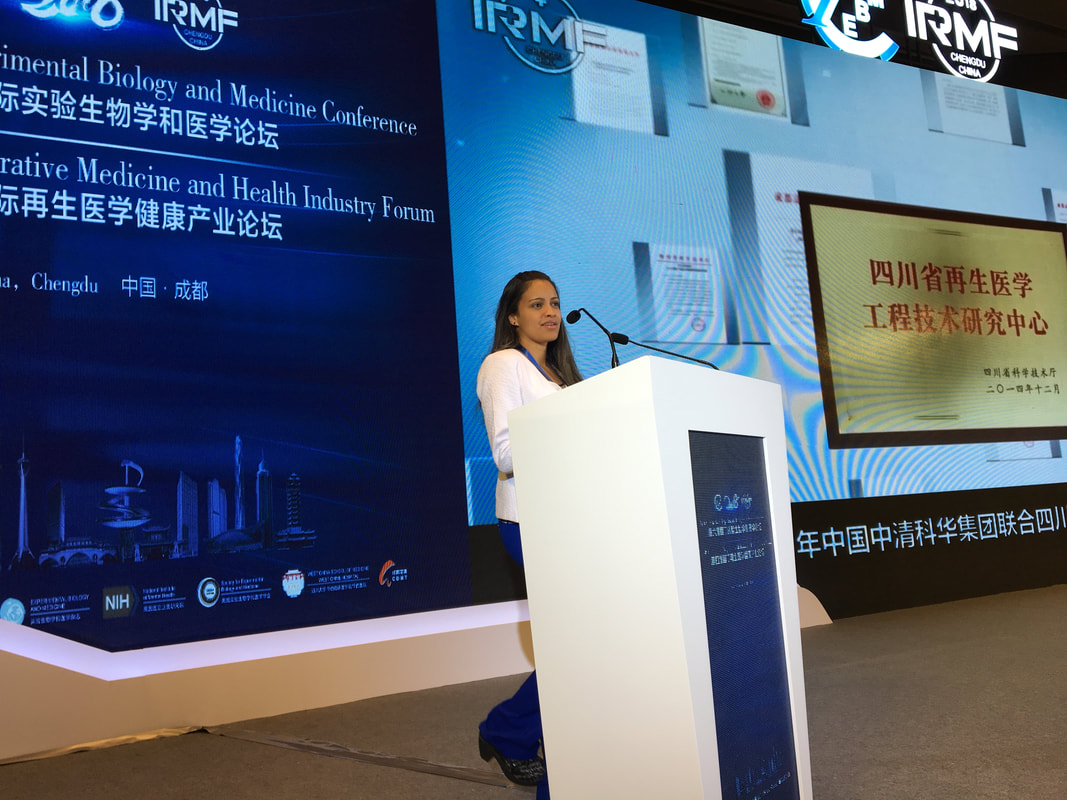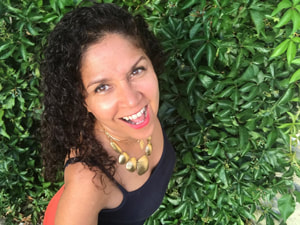Guest Blog Post: A Brilliant Student from Puerto Rico Makes Her Way and Shines in Science12/15/2018 As part of our monthly series of guest post, I present to you Nathalie Fuentes. A student from my hometown of Caguas, Puerto Rico, Nathalie is currently pursuing her PhD at Penn State College of Medicine. She was selected from among over 400 applicants to me International Exchange Program for Minority Students. Nathalie reminds me so much of my younger self in her projection of confidence while battling internal insecurities and impostor syndrome. Here she is in her own words.
I was born and raised in Caguas, the heart of Puerto Rico, to humble parents. I was always interested in science. Starting at the age of 5 with my first project presentation at a science fair, my curiosity and urge to know and understand the human body led me to study its function, and the factors that can affect human health. During high school and thanks to the help of a wonderful teacher, Mrs. Lourdes Hernández, I began to visit research laboratories located in the Medical Sciences Campus of the University of Puerto Rico, where I knocked countless doors. While many scientists told me “No”, my patience and perseverance paid off when one researcher, Dr. Carmen L. Cadilla, said “Yes”. Then, at 15 years old, I was selected by Dr. Cadilla as an intern in her NIH-funded Short-term Research Experience for Underrepresented Persons (STEP-UP) I received funding from the National Institutes of Health (NIH) Short-Term Research Experience for Underrepresented Persons (STEP-UP) Program to support my participation in six summer internships. Despite many accomplishments and the skills and knowledge I have sought out and acquired, my journey as an undergraduate student was not easy. I started my undergraduate studies in Chemistry at the University of Puerto Rico. During my sophomore year, I decided to transfer to a Biochemistry program at Iowa State University. It was clear that this change would bring many challenges, but I did not know all the consequences and responsibilities that would come with this decision. My family had very little financial resources, and to help overcome some costs, I had to work as a research assistant during the day and as a tutor during the night. In addition, I never expected that the English language would be such a hard obstacle for me. I clearly remember how during my first oral presentation, a student asked me if I was truly speaking English because it was incomprehensible. Even though I felt my world crumbling, I used that as motivation to raise my GPA and conquer my dream of becoming a scientist. Throughout my journey as a student in the United States, I also faced many of the challenges associated with being an underrepresented minority woman in science. However, I always searched, found and created my own opportunities to accomplish my goals by becoming a well-trained and versatile researcher. As an undergraduate student, I was able to explore and conduct research in different scientific topics. For example, during a summer internship at Pennsylvania State University, I studied signal transduction pathways that control tumor suppression, gene expression and chromatin remodeling in leukemia. As an Iowa State McNair scholar, my research about methanotrophic bacteria led to a publication in the Journal of Inorganic Biochemistry. Also, during this time, I obtained independent funding to join a scientific team at Harvard University, where I investigated the role of retinal ganglion cells with the end-goal of developing novel treatment for optic nerve degenerative diseases. Soon after I completed my undergraduate studies in Biochemistry and Linguistics, and had the opportunity to be selected as a fellow of the 2015 Mount Sinai International Exchange Program for Minority Students. This prestigious program allowed me to conduct research at the University Federal of Rio de Janeiro in Brazil, working on genetic engineering microorganisms for bioremediation. I always knew that graduate school was my next step. The application process was nerve-wracking. I never felt 100% confident that I was going to get into my dream school. During my first interview, I felt so anxious, to the point where I just cried because of how stressed I was. After 5 interviews and 5 acceptance letters, I decided to join the Biomedical Sciences Program at Penn State College of Medicine. I based my decision on the school ranking, type and quality of research, location and mentors with funding available. My first years as a graduate student were tough. I remember walking through the doors of Penn State College of Medicine with a lot of enthusiasm, bright-eyed and driven to excel in my graduate studies. I felt unstoppable, without knowing that in a matter of days everything was about to change. Feelings of insecurity started to arise. I was feeling suffocated with that pressure of being obligated to excel. For the first time in years of an exciting scientific career, I was feeling like an impostor. I did not know what to do, until I discovered that the key was to find the right mentor. I joined Dr. Patricia Silveyra’s lab, which focuses on respiratory disease. The reason why I chose to study lung disease was because my grandfather, the man who helped raise me, died of a pulmonary disease. I decided at that moment to think outside the box and explore molecular processes that govern the functioning of lung disorders. Dr. Silveyra’s guidance gave me the support that I needed to not only overcome these obstacles, recognizing the existence of “impostor syndrome” and strategies to overcome it, but also to become a well-trained scientist, a leader in the community, and a role model for future scientists. My main scientific goal now is to understand the immunological basis of the sex differences observed in asthma exacerbation triggered by air pollution. In almost four years of work, I have made significant progress in my experimental work, as well as in career development. I have published two papers as first author, and submitted two additional ones. I have contributed to several other manuscripts, review articles, and book chapters from the lab. I have been recognized with local, national, and international awards. Most importantly, I have focused on mentoring underrepresented students interested in science. Training and working with people from diverse backgrounds is an adventure. Science benefits from diversity! It amazes me how different perspectives can contribute to produce better research. What have I learned from this journey? First, besides all the knowledge acquired, I have found role models that motivated me, taught me to uncover my true potential and overcame my barriers. Mentors provide knowledge and can see where we need to improve. They always find ways to stimulate our personal and professional growth. My advice to students starting their journey is this: Find someone who you admire and respect, and who has a career path similar to the one you aim to follow. Also, we naturally have the predisposition to get trapped on the negative and think about our failures, instead of counting our victories. Initiative and motivation are indispensable. Successful students not only have brilliant ideas but they take initiative and carry them forward. If you need help, ask. If you have questions, ask. Don’t be afraid! Obstacles are inevitable, but successful people never give up.
0 Comments
Your comment will be posted after it is approved.
Leave a Reply. |
This section will not be visible in live published website. Below are your current settings: Current Number Of Columns are = 1 Expand Posts Area = 1 Gap/Space Between Posts = 8px Blog Post Style = card Use of custom card colors instead of default colors = 1 Blog Post Card Background Color = current color Blog Post Card Shadow Color = current color Blog Post Card Border Color = current color Publish the website and visit your blog page to see the results AuthorDr. Luz Claudio is an environmental health scientist, mother and consultant, originally from Puerto Rico. She is a tenured professor of environmental medicine and public health. Luz recently published her first book: How to Write and Publish a Scientific Paper: The Step-by-Step Guide. Dr. Claudio has internship programs and resources for young scientists. Opinions expressed in this blog are solely her own and may not reflect her employer's views. Categories
All
|
|
Dr. Luz Claudio
[email protected] |
|
Opinions expressed in this website are solely Dr. Luz Claudio's own and may not reflect her employer's views. None of the information on this website should be taken as medical advice.
© COPYRIGHT 2018. ALL RIGHTS RESERVED.



 RSS Feed
RSS Feed